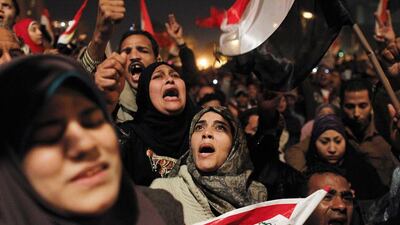In last week’s annual Arab Youth Survey, young Arabs were represented as valuing stability more than democracy. Stability is relatively easy to define in the context of the continuing upheavals in the Middle East.
But when respondents were asked about democracy, in a survey that framed the so-called Arab Spring as a fight “for political freedom”, what precise definition of the word was uppermost in everyone's minds?
Are all parties here talking in the broader sense about deliverance from and safeguards against those in the political classes who would limit freedom of expression and pathways to prosperity and self-determination? Or do we mean representational multiparty systems and elected assemblies with powers ultimately to determine national policy and peacefully choose and eject their leaders through the ballot box?
Is the best form of democracy a UK-style system, with the monarch as head of state, a sovereign parliament and an independent judiciary? Or do we opt for US-style direct democracy, leading to the checks and balances of Congress and fixed-term presidents who are also designated commanders-in-chief?
Were systems such as these foremost in the minds of those who took part in the Arab Spring? Did hundreds of thousands of young Arabs venture into the streets to fight and in many cases die specifically for free elections and representative assemblies? Or did they do so first because they lacked the basic means for a dignified existence – social mobility, safety, freedom from corruption and the bureaucratic predations of sclerotic state institutions?
Is there a universally accepted off-the-shelf definition of democracy for the Middle East that takes into account the relative youth of some Arab countries, the deep divisions caused by tribalism and sectarianism and differing interpretations of the role of religion in society?
The word is bandied about as though it was some instantly applicable, magically efficacious balm for the region’s ills. It is used by outsiders as a stick to beat regional governments and by insiders as an oversimplified political leitmotif.
What the survey shows is that stability and democracy exist, in that order, on the same social and political continuum and that in order for the latter to take root in whatever form it may take, the region must first have the former. There is no chicken and egg argument to be made here.
The UAE is ranked again as the place most young Arabs want to live and whose systems and policies respondents believed their own country should most emulate. The social contract on offer to locals as well as to expatriates from the Arab diaspora depends not on democratic institutions, but on the provision of – according to the survey and in no particular order – a safe environment, a growing economy and job opportunities.
The same survey ranks the US second after the UAE on these same benchmarks. But the two countries are completely different in terms of their political settlements. Even local police chiefs in the US are elected.
Their proximity in the minds of young Arabs is nothing to do with governmental systems but rather is due to the belief that both countries offer, first and foremost, opportunities for personal advancement in a safe and predictable social setting. The lack of these things, it could be strongly argued, underpins the entire narrative of the Arab Spring and serves, as the survey points out, as a key driver for recruitment to outfits such as ISIL.
None of this is to say that democracy in the Middle East is redundant, or that Arab youth has done away with it as an aspiration, even if many seem to have a problem defining it in the context of the region.
The region has a very large, young, educated and connected youth. Even though the Arab Spring failed to secure better conditions, it did illustrate that Arab leaders who fail their people could be accountable.
Many of the remaining stable Arab states are embarking on intense diversification programmes that will be hampered if bottom-up involvement and consent is not secured. The necessary transformation of the economies of these states in the low oil price era will include a reduction in subsidies, government cuts, measures to increase productivity, the opening up of the economy to external interests and the transformation of education in preparation for a knowledge-based economy.
All this will enliven avenues for participation in, and curiosity about, national development. Fledgling representative assemblies such as the UAE's Federal National Council will hopefully mature in outlook and capacity as the business of representation and consensus is learnt over time and developed.
What young Arabs appear to want, as a precondition of this process, is a break from uncertainty and fear, the freedom to plan and not just react and an opportunity to grab the reins of self-determination.
Martin Newland is a former editor-in-chief of The National

